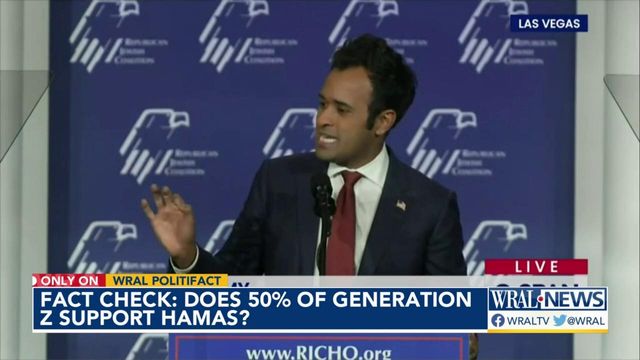Fact check: Is Gen Z is divided '50-50' on supporting Hamas or Israel?
Republican presidential candidate Vivek Ramaswamy recently discussed Jewish Americans’ fears and the domestic threats they face after Hamas attacked Israel on Oct. 7. He then suggested that Generation Z is not supportive.
Generation Z, born between the late 1990s and early 2010s, "is divided 50-50 on whether they support Hamas or Israel," Ramaswamy said at the Oct. 28 speech to the Republican Jewish Coalition in Las Vegas. "Young people in the country are lost."
Is it true that Hamas — the political and military organization that governs Gaza and is classified as a terrorist group by the U.S. State Department — has strong support among Gen Z? Although Ramaswamy’s comment came after a spate of antisemitic incidents at U.S. colleges, the evidence that Gen Z widely supports Hamas is thin.
One poll found a roughly 50-50 split among younger respondents, but it was based on a small subsample of people, and that age group also gave other answers in the poll that seemed to contradict support for Hamas. Three other polls found lower rates of support for Hamas.
We contacted Ramaswamy’s campaign for comment but did not receive a reply.
Harvard-Harris poll has similar finding, with a caveat
A Harvard-Harris poll conducted in October after the Hamas attacks seems to fit Ramaswamy’s talking point. One question asked, "In general in this conflict, do you side more with Israel or Hamas?"
Overall, the poll of 2,116 respondents found that 84% of Americans sided with Israel and 16% with Hamas. But the support for Israel differed sharply by age, with the highest rates of support for Israel among the oldest respondents.
Among 18-to-24-year-olds, 52% supported Israel and 48% supported Hamas. However, the sample size for this age group was small, about 199 people.
Generally, fewer respondents means a larger margin of sampling error. That’s because the fewer people polled, the less likely the sample of respondents will fully reflect the entire group’s beliefs.
Peculiarities with responses in Harvard-Harris poll
Another concern: The 18-to-24 age group gave other responses that seemed to contradict support for Hamas.
By 2-1 margins, respondents in that group said Hamas’ Oct. 7 action "was a terrorist attack"; that the attacks "were genocidal in nature"; that Israel has "a responsibility" to retaliate "against Hamas terrorists"; and that Hamas "is a terror group that rules Gaza with force and fear and is not supported by them."
Dritan Nesho, founder and chief executive officer of HarrisX, the company that conducted the poll, said these seemingly contradictory views might be related to Gen Z’s youth and relatively unformed views on the conflict. Nesho said Gen Z respondents typically haven’t long followed the Middle East and its political complexities.
The data showing divergent answers to poll questions signals that many respondents of this age "don’t have a clear distinction between Hamas the terrorist organization and the Palestinian national movement," Nesho said.
Other polls show less Hamas support
The Harvard-Harris poll also appears to be an outlier.
We found three other polls conducted around the same time that asked questions about blame for Israel and Hamas. None showed support for Hamas as high as the Harvard-Harris poll.
The strongest rebuttal comes from a Generation Lab poll taken Oct. 11 to Oct. 16 that surveyed only college students, 833 of whom said they knew of Hamas’ attacks. Of that group, 67% described the attacks as an act of terrorism by Hamas, compared with 12% who saw it as a justified act of resistance. The poll also found that 52% blamed the attack on Hamas, compared with 11% who blamed it on Israel.
Two other polls examined responses from slightly different age ranges than the Harvard-Harris poll. Those also showed higher support for Israel.
An NPR-PBS-Marist poll conducted Oct. 11, found that 48% of the 223 18-to-29 year olds surveyed said the U.S. government should "support Israel," while 12% said it should "criticize Israel." Though the sample size also is small, the levels of support for Israel and Hamas are different from the more equal levels shown in the Harvard-Harris poll.
A Quinnipiac poll, taken Oct. 12 to Oct. 16, found that 19% of 18-to-34 year olds said Israel is more responsible for the outbreak of violence, while 55% said Hamas is. Again, the levels of support are not equal, as they were in the Harvard-Harris poll. The Quinnipiac poll did not specify the number of 18-to-34 year olds surveyed.
PolitiFact ruling

Ramaswamy said, "Gen Z is divided 50-50 on whether they support Hamas or Israel."
A Harvard-Harris poll found that among 18-to-24 year olds, 48% said they sided with Hamas. However, that was based on a small subsample of 199 people. And that age group also gave other poll answers that seemed to contradict support for Hamas.
Three other polls found lower Hamas support among Generation Z.
For some people, any level of support for Hamas among Americans will be viewed as troubling. But Ramaswamy has exaggerated by saying it’s 50%.
The statement contains an element of truth but ignores critical facts that would give a different impression. We rate it Mostly False.











